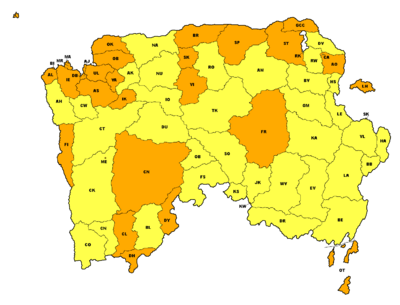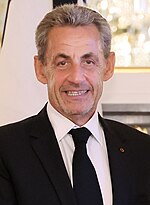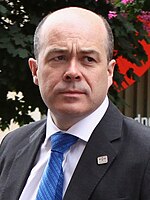2023 Alaoyian Presidential Election: Difference between revisions
No edit summary |
No edit summary |
||
| Line 48: | Line 48: | ||
The 2023 Alaoyian presidential election was the 9th quintannual presidential election, on 19 November. In addition to president, voters also elected members of the [[Alaoyian Senate|Senate]] and many local offices as well. As no candidate for president received more than half of the valid votes in the first round, a runoff election was held on 3 December. [[Durand Francois]] received a majority of votes cast in the second round, and therefore was elected as [[President of Alaoyi]]. | The 2023 Alaoyian presidential election was the 9th quintannual presidential election, on 19 November. In addition to president, voters also elected members of the [[Alaoyian Senate|Senate]] and many local offices as well. As no candidate for president received more than half of the valid votes in the first round, a runoff election was held on 3 December. [[Durand Francois]] received a majority of votes cast in the second round, and therefore was elected as [[President of Alaoyi]]. | ||
Incumbent Democratic President [[Adriaan Breytenbach]] was ineligible to pursue a third term due to the term limits established | Incumbent [[Alaoyian Democratic Alliance|Democratic]] President [[Adriaan Breytenbach]] was ineligible to pursue a third term due to the term limits established in Alaoyi's constitution. The Democratic nomination thus went to the leader of the right-wing Democrats and former governor of [[Blinnoblair]], [[Alexander O'Haig]]. The [[Alaoyian Socialist Party|Socialist]] nomination went to the former mayor of and senator from [[Magada]]. Other major nominations included businessman [[Chris O'Riley]] of the [[National Populist Party (Alaoyi)|National Populist Party]], former ambassador [[Finch Matthews (Alaoyian politician)|Finch Matthews]] of the [[Alaoyian Republican Alliance|Republican Alliance]], and [[Joren Kleinlugtenbelt]] of the [[Alaoyian Farmer's Alliance|Farmer's Alliance]]. This made the 2023 election the first election where all major candidates were of Diash-descent. | ||
Early campaigning focused | Early campaigning focused on Breytenbach, a relatively popular president, and his legacy. While Democratic nominee Alexander O'Haig was of Breytenbach's party, he was from a rival faction that disagreed with the more moderate Breytenbach on most major issues, while Durand was more in line with his views on foreign policy and decentralization. In contrast, O'Riley and Matthews attempted to portray themselves as outsiders seeking to clean up politics, while Joren Kleinlugtenbelt tried to portray himself a centrist. | ||
Revision as of 02:07, 15 January 2024
| ||||||||||||||||||||
| Registered | 143,370,001 | |||||||||||||||||||
|---|---|---|---|---|---|---|---|---|---|---|---|---|---|---|---|---|---|---|---|---|
| Turnout | 78.1% (first round) 82.1% (second round) | |||||||||||||||||||
| ||||||||||||||||||||
 Entities won by Durand Francois
Entities won by Chris O'Riley | ||||||||||||||||||||
| ||||||||||||||||||||
The 2023 Alaoyian presidential election was the 9th quintannual presidential election, on 19 November. In addition to president, voters also elected members of the Senate and many local offices as well. As no candidate for president received more than half of the valid votes in the first round, a runoff election was held on 3 December. Durand Francois received a majority of votes cast in the second round, and therefore was elected as President of Alaoyi.
Incumbent Democratic President Adriaan Breytenbach was ineligible to pursue a third term due to the term limits established in Alaoyi's constitution. The Democratic nomination thus went to the leader of the right-wing Democrats and former governor of Blinnoblair, Alexander O'Haig. The Socialist nomination went to the former mayor of and senator from Magada. Other major nominations included businessman Chris O'Riley of the National Populist Party, former ambassador Finch Matthews of the Republican Alliance, and Joren Kleinlugtenbelt of the Farmer's Alliance. This made the 2023 election the first election where all major candidates were of Diash-descent.
Early campaigning focused on Breytenbach, a relatively popular president, and his legacy. While Democratic nominee Alexander O'Haig was of Breytenbach's party, he was from a rival faction that disagreed with the more moderate Breytenbach on most major issues, while Durand was more in line with his views on foreign policy and decentralization. In contrast, O'Riley and Matthews attempted to portray themselves as outsiders seeking to clean up politics, while Joren Kleinlugtenbelt tried to portray himself a centrist.

